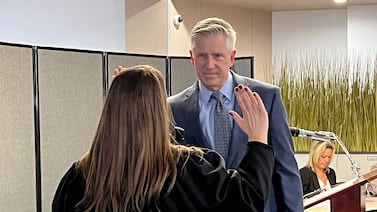Sign up for Chalkbeat Tennessee’s free daily newsletter to keep up with statewide education policy and Memphis-Shelby County Schools.
Tennessee House members looking into the feasibility of rejecting federal education funding aren’t recommending taking that dramatic action, but they do want a comprehensive study of food waste in school cafeterias under federally funded child nutrition programs.
They also want their chamber to begin reviewing any new federal rules and directives sent to the state education department. And they want to conduct annual hearings into federal requirements for student testing.
The actions are among a handful of recommendations outlined in a 13-page report submitted Jan. 19 by House members to legislative leaders.
During five days of hearings in November to study what federal money Tennessee receives for its K-12 students and schools, House members frequently zeroed in on food waste through school programs funded by the U.S. Department of Agriculture.
Rep. John Ragan, an Oak Ridge Republican, suggested that Tennessee could do a better job of overseeing such programs to improve their efficiency, but that more information is needed.
Anderson County Schools, which is located in Ragan’s district near Knoxville, has studied food waste at one of its schools. But few other Tennessee districts have, and there’s no statewide data measuring the amount of uneaten food in cafeterias.
Milk and vegetables tossed in the trash
Nationally, about 41% of milk and 31% of vegetables were discarded from lunch trays, according to the Agriculture Department’s 2019 School Nutrition and Meal Cost Study.
“When you have a $480 million program (in Tennessee), 31% waste is a lot of money that could be devoted to hiring more teachers, buying more classroom supplies, fixing the roof, whatever,” Ragan told Chalkbeat after the hearings.
He said his goal is “not to starve children, but to optimize these programs.”
The House report recommends that the state agriculture and education departments evaluate food waste in public schools, and determine whether to contract with an outside agency to develop an improvement plan.
The U.S. Department of Agriculture has a list of recommended strategies to encourage students to consume more of the food they take — seemingly simple things like giving students choices, extending lunch time, and letting students save nonperishable foods to eat later.
In Tennessee, some schools have used other strategies such as offering breakfast in classrooms and letting students share unopened, wrapped foods with peers at “share tables,” Debby Thompson, assistant state commissioner of federal programs and oversight, told the lawmakers in November.
Meals under school nutrition programs are served free or at reduced cost to eligible students, and cafeteria operators must comply with federal nutritional requirements.
Meanwhile, in response to a rise in childhood obesity and other diet-related diseases during the pandemic and to improve the health of children and adolescents, the Biden administration has been rolling out more stringent nutrition standards for school meals. The policies reinstate health goals that were rolled back during the Trump administration.
How House and Senate reports on education funding differed
The House report came nearly two weeks after Senate members of the joint legislative panel on forgoing federal education funding issued their own report, citing disagreements with their House colleagues about their findings and recommendations.
The plan had been for the panel to submit a single report about exactly what federal money Tennessee receives for its students and related federal requirements.
The Senate report was cautionary, and much of it mirrored analysis from the nonpartisan Sycamore Institute. It highlighted the risks associated with rejecting about $1.3 billion in federal money and trying to fill the gap with state revenues. Most of the funding goes to support low-income students, English language learners, and students with disabilities.
The House report was more action-oriented and offered recommendations, some of which may not require legislation, said Connor Grady, a spokesperson for House Speaker Cameron Sexton, who has been pushing the conversation for nearly a year.
“The House agreed with the Senate’s options for consideration. However, the Senate would not agree with the House’s actionable recommendations moving forward,” Grady said. “Each body will be moving forward with their own recommendations.”
Sen. Jon Lundberg, co-chair of the legislative panel, said the House recommendations, if followed, could add bureaucratic layers to state government and slow down the work of the education department.
“That’s why we have a (state) Department of Education, to deal with these kinds of issues,” the Bristol Republican said Wednesday.
But Sexton’s office says more oversight is needed on the acceptance of federal funds.
“Allowing the federal government to pass down rules onto Tennesseans with no oversight is our main concern.” Grady said. “The General Assembly and Tennesseans need to know what federal rules are being passed down onto them. We should do everything that we can to be whole and autonomous and independent from the federal government.”
Discussion is not over
Both reports were called “preliminary” by the panel’s leaders, who said the group may continue to meet.
While not in its recommendations, the House report suggested the legislature could get involved in processes for renewing federal grants.
The legislature could “implement a process for legislative authorization of grants, such as requiring grant applications to go before a legislative committee before an agency can submit an application,” the report said.
The House report was submitted by all four Republican representatives on the panel, but not the lone Democrat. Rep. Ronnie Glynn, of Clarksville, refused to sign the document, saying that movement toward rejection of federal funding would be “fiscally irresponsible and discriminatory.”
“The hearings made clear how harmful such a move would be to Tennessee’s school children and how detrimental it would be to taxpayers and our state’s budget,” said a statement about Glynn’s position, issued Thursday by the House Democratic Caucus.
Below, you can read the full House report.
Editor’s note: This story has been updated to show that Rep. Ronnie Glynn, a Democrat, did not sign the report.
Marta Aldrich is a senior correspondent and covers the statehouse for Chalkbeat Tennessee. Contact her at maldrich@chalkbeat.org.







